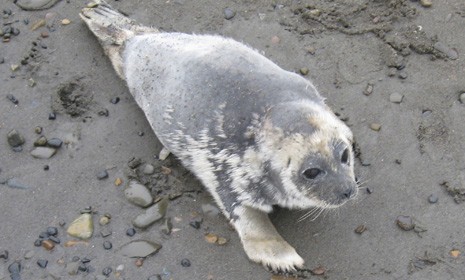The 'mysterious' disease killing Alaskan seals
An unknown virus is causing hordes of ringed seals to develop bleeding lesions and beach themselves on Arctic coasts. What's behind this deadly outbreak?

A free daily email with the biggest news stories of the day – and the best features from TheWeek.com
You are now subscribed
Your newsletter sign-up was successful
In July, Alaskan ringed seals began beaching themselves on the Arctic coastline, where they soon died. Worse yet: In subsequent months, their numbers have only increased. Puzzled biologists believe the phenomenon is being triggered by an unknown virus. "We’re kind of in the dark at this point," says Bruce Woods, a spokesman for the U.S. Fish and Wildlife Service. What's going on? Here's what we do know:
What's wrong with the animals?
What makes this case so peculiar is ringed seals "do not generally come ashore," says Allison Berry of TIME — they typically live underwater or on floating ice deposits. As far as symptoms go, the animals are suffering from "bleeding lesions on [their] hind flippers, loss of fur, and skin irritation around the nose and eyes."
The Week
Escape your echo chamber. Get the facts behind the news, plus analysis from multiple perspectives.

Sign up for The Week's Free Newsletters
From our morning news briefing to a weekly Good News Newsletter, get the best of The Week delivered directly to your inbox.
From our morning news briefing to a weekly Good News Newsletter, get the best of The Week delivered directly to your inbox.
How many seals has the disease claimed so far?
At least 46 seals have died from the "mysterious" disease, says Stephen Messenger of Treehugger, and "150 others appear to be infected." But that's not all: Alex DeMarban of Alaska Dispatch says that the "bizarre, festering sores" are also showing up on local walruses, with scientists estimating that up to 600 of the tusked creatures may be infected. This is particularly troubling because the Pacific walrus population is only "100,000 strong" and is currently "being considered for protections under the Endangered Species Act."
What are scientists doing to help?
To identify the source of the disease, they're working with the North Slope Borough Department of Wildlife Management, and have sent tissue samples to labs in the U.S. and Canada. In terms of veterinary care, access is "limited" because of the seals' remote locations, says Berry, and the animals are largely left to fend for themselves, which leads to other problems. "Unfortunately, seals that are weakened are less able to fight off predators, such as polar bears."
A free daily email with the biggest news stories of the day – and the best features from TheWeek.com
Sources: TIME, Treehugger, Alaska Dispatch, Reuters
-
 One great cookbook: Joshua McFadden’s ‘Six Seasons of Pasta’
One great cookbook: Joshua McFadden’s ‘Six Seasons of Pasta’the week recommends The pasta you know and love. But ever so much better.
-
 Scientists are worried about amoebas
Scientists are worried about amoebasUnder the radar Small and very mighty
-
 Buddhist monks’ US walk for peace
Buddhist monks’ US walk for peaceUnder the Radar Crowds have turned out on the roads from California to Washington and ‘millions are finding hope in their journey’